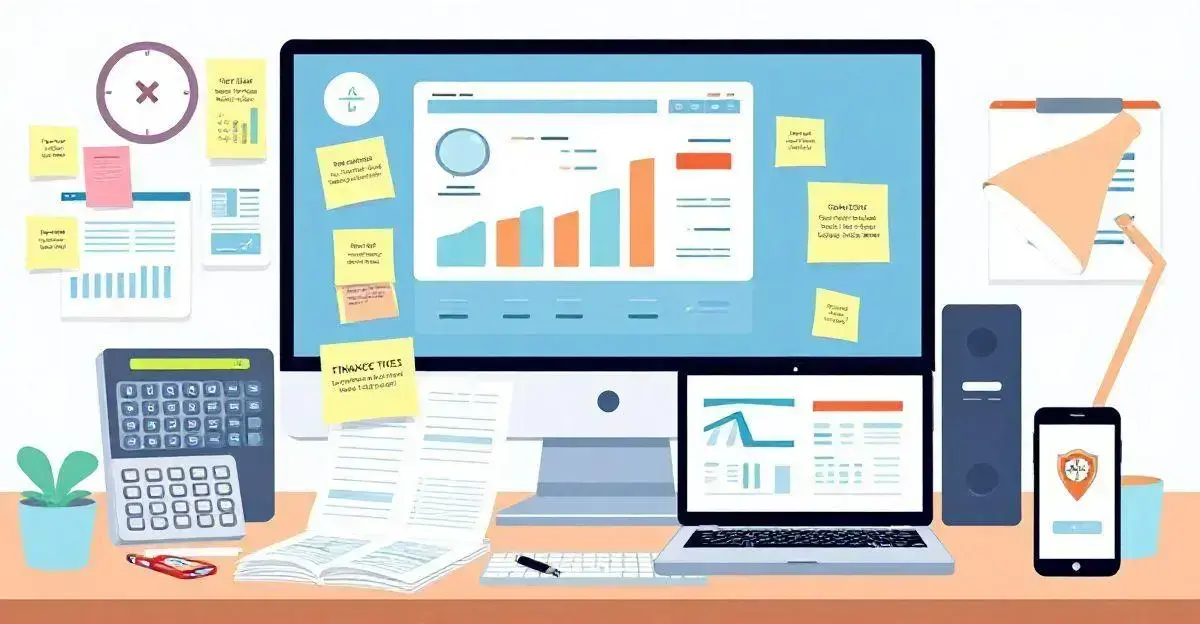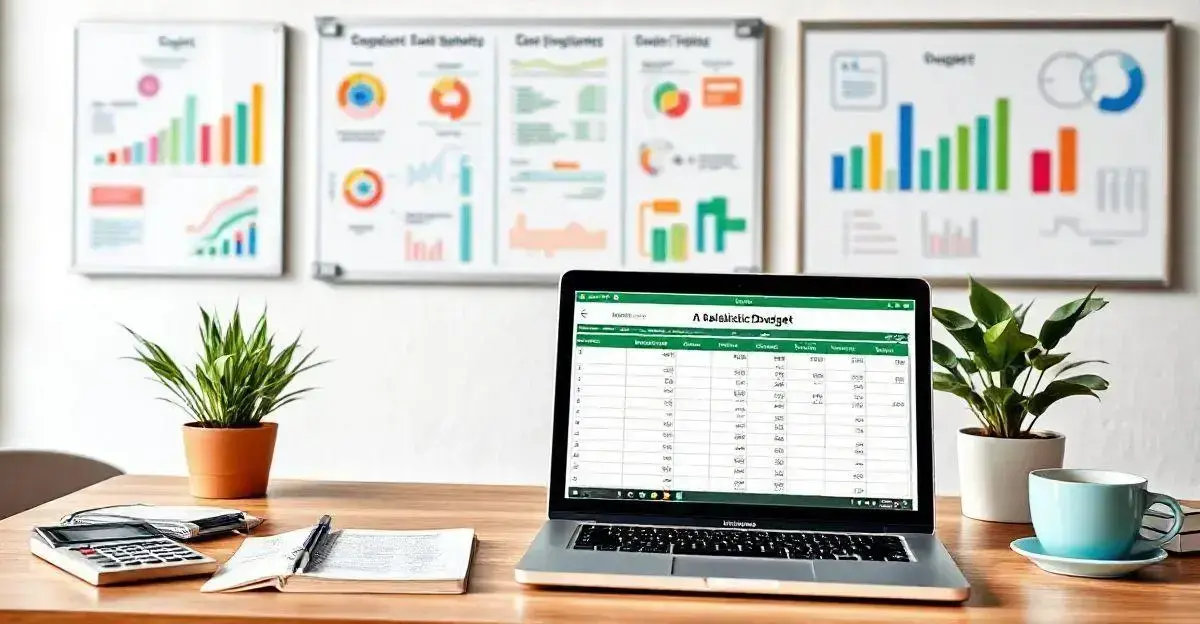Budget management is key to maintaining financial health. By managing your finances effectively, you can ensure your resources are used wisely and avoid unnecessary debt. A solid budget helps you stay on track with both everyday expenses and future savings.
Tracking your spending and setting realistic financial goals are essential steps in budget management. With the right plan, you can prioritize your needs and adjust as life changes.
Ready to take control of your finances? Keep reading for practical tips to make your budget work for you.
Understanding Budget Management Basics
Understanding budget management is essential for achieving financial stability. Budget management involves the process of creating a plan to spend your money effectively. This plan helps you prioritize your expenses, ensuring that you can meet your financial obligations while also saving for future goals.
To begin mastering budget management, track your income and expenses diligently. This makes it easier to identify spending patterns and areas where you can cut costs. Categorizing your expenses into fixed and variable costs can provide further insights into your financial situation.
Another vital aspect is setting realistic financial goals. Whether it’s saving for a big purchase or paying off debt, having specific targets can motivate you to stay on track. Additionally, regularly reviewing and adjusting your budget can help you respond to changes in income or expenses, keeping you on the path to financial success.
Finally, consider utilizing budget management tools or apps that can simplify the tracking process. With these resources, you can easily monitor your finances, set reminders for bills, and analyze your spending habits. By mastering the basics of budget management, you pave the way for a more secure financial future.
The Importance of Effective Budgeting

The importance of effective budgeting cannot be overstated. Having a solid budget helps you control your finances and make informed decisions. Effective budgeting enables you to allocate resources wisely, ensuring that you can cover your expenses while also saving for future needs.
When you create a budget, you’re setting a financial roadmap. This roadmap assists you in tracking your spending, which is vital for avoiding unnecessary debt. By knowing where your money goes, you can adjust your habits and prioritize essential expenses over luxuries.
Additionally, a well-structured budget can help you prepare for emergencies. Life is unpredictable, and having savings set aside can provide peace of mind. This is why factors such as an emergency fund should be included in your budget planning.
Moreover, effective budgeting can improve your financial goals. Whether you want to travel, buy a home, or save for retirement, having a clear budget allows you to track your progress. By staying disciplined and revisiting your budget regularly, you can ensure that your goals remain achievable.
Lastly, employing budgeting tools or apps can make this process easier and more efficient. These tools can help automate tracking, making budgeting less daunting. In summary, the benefits of effective budgeting are clear: it fosters financial discipline, enables goal achievement, and prepares you for life’s uncertainties.
Common Budgeting Mistakes to Avoid
Common budgeting mistakes can derail your financial plans and make it hard to achieve your goals. The first mistake is not tracking your expenses. By ignoring where your money goes, you can easily overspend and lead yourself into debt. Keeping a record helps identify patterns that can be adjusted for better results.
Another frequent error is setting unrealistic budget goals. It’s essential to create a budget that reflects your actual income and necessary expenses. A budget should be achievable. Setting overly ambitious targets can lead to frustration and abandonment of your budgeting efforts.
Failing to account for irregular or unexpected expenses can also cause problems. Always include a category for these expenses, such as car repairs or medical bills, to ensure you’re prepared. Underestimating these costs can throw your entire budget off balance.
Additionally, some individuals do not adjust their budgets regularly. Life changes, and so should your budget. Regularly reviewing and revising your budget can help you stay on track and avoid mistakes that may arise from stagnant planning.
Finally, neglecting to save for emergencies is a significant oversight. Building an emergency fund should be a pillar of your budget strategy. This preparedness can save you from serious financial setbacks when unexpected situations arise.
Tools and Software for Budget Management

Tools and software for budget management can significantly simplify tracking your finances. There are several popular options available that cater to different needs. First, spreadsheets like Microsoft Excel or Google Sheets are excellent for customizable tracking. Users can create personalized budget templates and update them as needed.
Another option is budgeting apps such as Mint or YNAB (You Need A Budget). These applications link to your bank accounts, automatically tracking your expenses and categorizing them. They often provide useful insights into your spending habits, making it easier to stay on track.
If you prefer a more comprehensive solution, consider financial management software like Quicken. Quicken allows users to manage bills, investments, and income, all in one platform. Within the parameter of budget management, it offers tools for tracking expenses and creating reports.
In summary, using the right tools can greatly improve your budgeting efforts. Whether you choose spreadsheets, budgeting apps, or comprehensive financial management software, the key is to find a solution that works best for your financial situation.
Strategies for Personal Budgeting
Strategies for personal budgeting are key to managing your finances effectively. The first strategy is to set clear financial goals. Knowing what you want to achieve can guide your budget decisions. Whether it’s saving for a vacation or paying off debt, having a specific goal keeps you focused.
Another effective strategy is to track your spending habits. This helps you understand where your money is going and identify areas where you can cut back. Regularly reviewing your expenses can lead to smarter spending choices.
Creating a realistic monthly budget is also essential. It should include all sources of income and necessary expenses. Be sure to account for irregular expenses as well, like car maintenance or medical bills, to avoid surprises later.
A helpful technique is the 50/30/20 rule. This divides your income into three categories: 50% for needs, 30% for wants, and 20% for savings. Using this method makes it easier to balance your budget without feeling restricted.
Lastly, establish an emergency fund. This fund should cover unexpected costs like car repairs or medical emergencies. Having it in place reduces financial stress and keeps you from derailing your budget.
How to Create a Realistic Budget

Creating a realistic budget is essential for financial success. Start by assessing your income. This includes all sources of money, such as salary or freelance work. Knowing your total income allows you to determine how much you can realistically allocate to expenses.
Next, list out all your monthly expenses. Divide them into fixed and variable categories. Fixed expenses include rent, utilities, and subscriptions, while variable expenses can change month to month, like groceries and entertainment. Understanding both types will give a complete view of your financial obligations.
After listing expenses, prioritize them based on necessity. Needs should come before wants in your budget. This means ensuring that bills are paid before spending on luxuries.
Additionally, allocate funds for savings. A good target is to save at least 20% of your income. This can help build an emergency fund or assist in achieving future goals.
Lastly, check your budget regularly. Adjust it as needed. Monthly reviews help catch any overspending and allow you to adapt to changes in income or expenses. By maintaining ongoing awareness of your budget, you’ll be better equipped to stay on track.
Adjusting Your Budget for Unexpected Expenses
Adjusting your budget for unexpected expenses is crucial for financial stability. Unexpected costs can arise at any moment, such as medical emergencies or car repairs. To prepare for these situations, start by setting aside a portion of your income. This can be part of an emergency fund, designed to cover sudden expenses without derailing your entire budget.
When an unexpected expense occurs, review your current budget to see where adjustments can be made. Consider temporarily reducing discretionary spending on things like dining out, entertainment, or subscriptions. This allows you to allocate more funds to cover the unexpected cost without going into debt.
Additionally, keep track of any changes in your regular expenses. These could affect how much you can save each month. By being aware of your spending habits, you can make informed decisions about where to reallocate funds.
Regularly reviewing your budget can help you stay flexible. Monthly check-ins will allow you to assess your financial situation and make any necessary changes to accommodate new unexpected expenses.
Finally, always keep an eye on emergency savings. If you find yourself using your emergency fund, make a plan to replenish it as soon as possible. Maintaining this fund ensures you’re better prepared for future surprises.
Long-term Benefits of Proper Budget Management
Long-term benefits of proper budget management can greatly impact your financial future. First, it allows you to build savings over time. By consistently allocating funds for savings, you create a safety net for unexpected expenses. This safety net can relieve financial stress and provide peace of mind.
Another significant advantage is the ability to achieve financial goals. Whether you want to purchase a home, travel, or retire comfortably, having a budget helps you plan and track progress toward these goals. Establishing a clear plan makes it easier to stay focused and motivated.
Proper budget management also aids in minimizing debt. By knowing your limits and spending wisely, you can avoid borrowing money unnecessarily. This leads to a healthier credit score, which is vital for future loans or credit applications.
Furthermore, maintaining a budget promotes better financial habits. Over time, you will learn to prioritize needs over wants and identify areas where you can cut back. These habits foster a sense of discipline that benefits your overall financial health.
Lastly, a well-managed budget improves your financial literacy. You become more aware of your financial situation, including investment opportunities and retirement planning. This knowledge empowers you to make smarter choices in the long run.
Budget Management: Final Considerations
Effective budget management provides significant long-term benefits that can greatly impact your financial well-being. By building savings and minimizing debt, you create a strong foundation for a secure financial future.
Setting clear financial goals and maintaining discipline in spending fosters better financial habits, empowering you to achieve your aspirations. Regularly reviewing and adjusting your budget ensures that you remain aware of your financial situation, allowing you to make informed decisions.
Ultimately, proper budget management improves financial literacy, paving the way for smarter investments and a comfortable retirement.